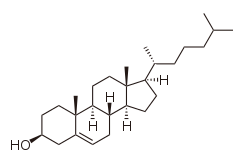What is the structure and function of Cholesterol in our body?
Before we go into more important facts, what is cholesterol?
We know that in our diet, a very important aspect is lipids. In biology, lipids comprise a group of naturally occurring molecules that include fats, waxes, sterols, fat-soluble vitamins, monoglycerides, diglycerides, triglycerides, phospholipids, and others
One important lipid, cholesterol, is needed for the proper functioning of cells and for maintaining a healthy body. However, too much cholesterol can lead to many health problems, which we will cover in later tabs.
Cholesterol is naturally produced in the liver and also absorbed from food as it passes through the intestines. From there, it is carried by the blood stream to the rest of the body. Cholesterol is needed by all cells in the body. Too much cholesterol in the blood can cause a build-up inside the arteries. Therefore, a balance of LDL and HDL molecules keeps circulating lipids from becoming trapped inside arteries.
Cholesterol's Functions
- Cell Membranes
- Can nearly take up half of a cell's membrane
- Maintains cell membrane's integrity
- Helps maintain fluidity
- Helps secure important proteins
- Memory
- Increases synapse production
What we mean by this, synthesis occurs at night. Synapses are connections in your brain. Cholesterol, while being produced at night, also creates more synapse connections. This allows for better memory and learning! Therefore, if you eat an egg a day and sleep at night, you will have better memory and it will be easier for you to learn.
- Digestion
- Bile Acid synthesis
Cholesterol helps synthesize bile acids. Bile Acids allow our digestive system to digest fats. Bile salts break up the fats, push them to the side and connect to them, then connect to water on their other side, in a way "mixing" the two together.
- Vitamin D
- Acts as a precursor for vitamin D. Since cholesterol is a precursor to vitamin D, inhibiting the synthesis of cholesterol will also inhibit the synthesis of vitamin D.
- Synthesis of Steroid Hormones
- Cholesterol is the precursor to all steroid hormones, including:
Mineralcorticoids (mineral balance and blood pressure regulation)
Sex Hormones (many functions)
"Cholesterol is the precursor to a hormone called pregnenolone, which has important functions itself, but is also the precursor to all other steroid hormones." (Cholesterol and Health.com)

